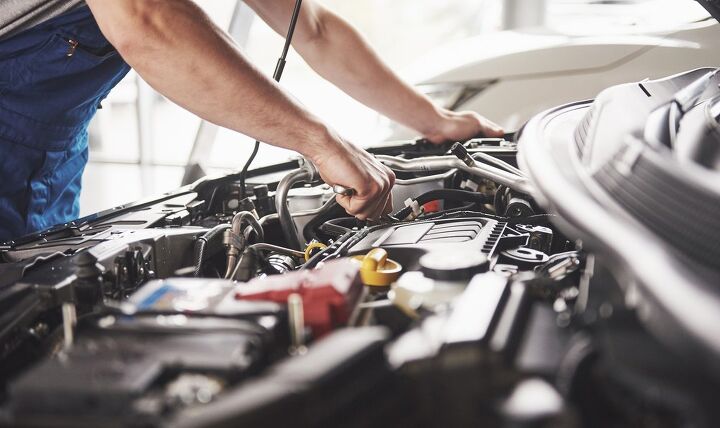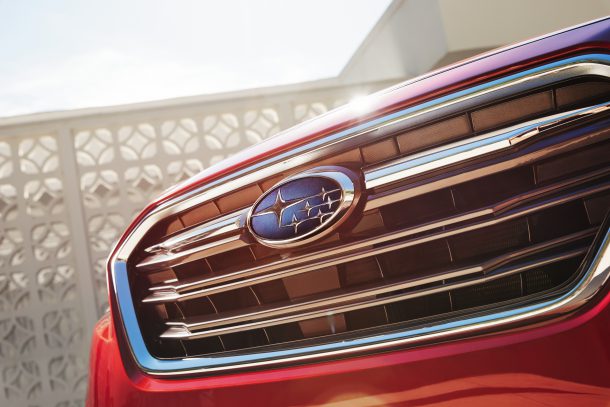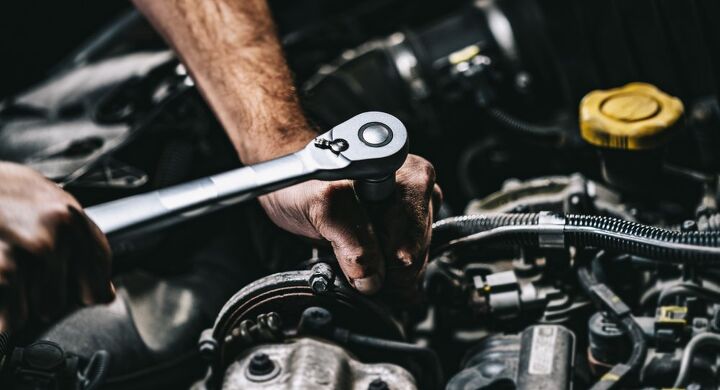#RightToRepair
Maine Approves Right-to-Repair Rules, Auto Lobby Annoyed
The State of Maine has voted "yes" to Question 4, which mimics the right-to-repair legislation that passed in Massachusetts three years earlier. This makes Maine the sixth state in the U.S. to approve such a measure and requires automakers to standardize modern vehicle onboard diagnostic systems and make them available to both customers and any independent repair shops they’d like to use.
While the decision represents another important victory for the right-to-repair movement, the world’s largest automotive lobby predictably bemoaned the situation.
How Much Privacy Do You Really Have In Modern Vehicles?
Whenever the issue of vehicular privacy comes up, the discussion almost immediately pivots to individuals either defending or condemning the status quo. But this often happens without either side of the argument having a firm understanding of how much information is actually being obtained inside today’s automobiles.
While we’ve covered the topic frequently, articles have typically focused on specific issues rather than overall scope. But things are different this time, with the Mozilla Foundation recently issuing a study trying to assess just how far-reaching the automotive industry’s quest for data has become.
Massachusetts' Right to Repair Law Finally Gets Go-Ahead From Feds
Right to repair is a contentious issue for all consumer products, especially smartphones and cars. Massachusetts voters approved a measure that would require automakers to open access to their over-the-air processes and data in 2020, but the feds only recently gave the okay for it to proceed after the NHTSA pumped the brakes.
NY Right-to-Repair Law Exempts Automakers
Governor Kathy Hochul has signed a right-to-repair bill into law for New York after it lingered within the state legislature for the better part of a year. However, many advocating for legal protections allowing consumers to fix and modify products have started criticizing changes made to the rule on behalf of large business entities hoping to see it neutered. While much of this pertains to the tech lobby representing companies like Apple, Microsoft, Amazon, and Google, sizable exemptions have been similarly carved out for automakers.
Automakers Claim They Can’t Comply With Right-to-Repair Laws
The State of Massachusetts' Right-to-Repair law was passed in 2012, laying the foundation for the rest of the United States to begin securing consumer protections that would allow them to work on the products they own. General Motors and Stellantis are now claiming they cannot possibly adhere to the rules and have done nothing to prepare for complying with the law.
Study Suggests Public Supports Right-to-Repair Movement
Most people who know their way around a wrench will tell you that vehicles haven’t gotten any easier to work on over the years. While modern automobiles tend to be longer lived than earlier models and on-board diagnostics have made issues somewhat easier to diagnose, decades of added complexity have made resolving those problems substantially more troublesome and costly. Modern engine layouts are focused on packaging, not on providing mechanics with easy access, and the sheer number of electrical components in today’s cars means that many parts that could have been repaired before now have to be replaced.
Europe Developing 'Battery Passport' for EVs
A group of German automakers, chemical concerns, and battery producers have announced the joint development of a “battery passport” designed to help government regulators trace the history of the cells. The consortium is funded by the German government and is supposed to work in tandem with new battery regulations that are being prepared by the European Union.
According to the German economic ministry, officially the Federal Ministry for Economic Affairs and Climate Action, the overarching plan is for the EU to mandate traceable hardware be installed in all batteries used in the continent by 2026. Those intended for use in electric vehicles are up first, with the passport scheme also serving to chronicle everything from the vehicle’s repair history to where the power cell’s raw materials were sourced.
More Western Leaders Call for the End of Private Vehicle Ownership
If there’s anything that’ll get my stomach into a twist, it’s the government talking about the merits of reducing people’s ability to own things. Fortunately, the 36-hour flu I just experienced made me nigh-invulnerable and someone had forwarded me the latest on what U.K. Parliamentary Under-Secretary for the Department for Transport Trudy Harrison had to say about personal vehicle ownership. She’s very keen on public transpiration but not so interested in the plebian masses having access to their own, individual modes of transport.
Earlier this month, she told a virtual audience at shared transport charity CoMoUK that the United Kingdom needed to move away from “20th-century thinking centered around private vehicle ownership and towards greater flexibility, with personal choice and low carbon shared transport.”
Right-to-Repair Victory Forces Subaru to Tweak Things in Massachusetts
Subaru of America will be canceling Starlink telematics subscriptions on all new 2022 vehicles sold in Massachusetts thanks to the state having an amended right-to-repair law that’s wildly unpopular with global automakers. If you’ve been following our coverage, Massachusetts has become ground zero for consumer advocacy groups, independent repair shops, and car buyers that have grown concerned with the industry’s increased interest in data hoarding.
The argument is that the automakers are now building vehicles that violate customer privacy — by wirelessly transmitting information back to manufacturer data farms — while also setting them up to make independent repairs nearly impossible. This resulted in an extended legal battle where the Alliance for Automotive Innovation (AAI) went to bat to ensure the industry retained this lucrative venture. But it was stymied by the grassroots campaign launched against it. Massachusetts’ updated law currently requires all vehicles sold within the state (from the 2022 model year onward) using telematics systems to be equipped with a standardized, open-access data platform that would allow customers and unaffiliated mechanics to gain access.
Right-to-Repair Movement Gets Federal Attention
While the right-to-repair movement is fighting a national battle, the brunt of the action has been taking place on America’s coasts. Consumer activists are taking on multinational corporations that don’t want you to modify your mobile devices, affix aftermarket components to your vehicle, or have complete access to the data that’s amassed by the staggering number of products that are needlessly networked to the internet. After years of petitioning the government, often while arguing with high-paid lobbyists, the group achieved a major victory in Massachusetts in 2020. Voters decided that automakers should not be allowed to withhold information from the vehicle’s owner or use it as a way to prohibit them from taking their car into independent repair shops (rather than manufacturer-certified service centers) or tinkering with it themselves.
Now the federal government is getting involved. Joe Biden has signed an executive order that effectively forces the Federal Trade Commission (FTC) to take regulatory action that would settle the matter. But we don’t really know if that’s going to lead to a market where customers are free to treat their property (and private data) as they wish, one where the manufacturer holds all the cards, or simply result in a regulatory minefield displeasing all parties.
Driving Dystopia: German Automakers Keep Reimagining Vehicle 'Ownership'
Volkswagen recently announced that it plans on making massive amounts of money by introducing more vehicles with over-the-air updates (OTAs), many of which will be able to store and transfer personal profiles so that users can effectively just rent their vehicles for eternity. Additionally, VW has suggested future models will have ability to lock features (that have already been physically installed) behind a paywall that users can unlock via subscription services — things like heated seats, satellite navigation, or even the vehicles top speed.
“In the future, our customers will buy, lease, share or rent cars just for a weekend, and we can use software to provide them with whatever they need over the air,” VW brand’s sales chief Klaus Zellmer said during an online presentation held on Tuesday. “The ID family has been designed for further development, with OTA updates to improve the software’s performance and tailor it to our customers’ needs.”
Supreme Court Allows Auto Aftermarket to Access APIs
The Supreme Court ruled on April 5th in the Google v. Oracle case, a copyright dispute over software. Their decision was that application program interfaces (API) are fair use in building compatible components.
Automotive Alliance Manages to Delay Revised Massachusetts Right to Repair Law
The Alliance for Automotive Innovation (AAI) has managed to stall enforcement of a ballot measure recently passed in Massachusetts that expands access to data related to vehicle maintenance and repair. Last week, the relatively new lobbying/trade group asked a U.S. district court for a temporary order that would bar implementation of the state’s new right-to-repair rules aimed at giving vehicle owners more direct control of their private data and independent repair shops a fighting chance of staying in business. But the state’s attorney general has already decided that the rules are invalid until after federal cases have been decided.
The decision represents another victory for giant, multinational corporations at the expense of disgusting citizens interested in controlling their personal information and small business owners who have had it easy for far too long.
Automakers Continue Battling Right to Repair Laws in Massachusetts
Despite Massachusetts voters approving a ballot initiative giving customers and independent repair shops more access to the massive amount of data being tabulated by modern cars by a sizable margin, automakers haven’t given up their unpleasantly consistent opposition to the right-to-repair movement. Backed by consumer advocates, unaffiliated repair shops, the aftermarket community, and those interested in D.I.Y. projects, the movement has made meaningful headway in MA under the updated laws. Vehicles that collect and transmit information back to the automaker manufactured for 2022 (or later) model year are now required to be paired with a standardized open-access data platform accessible by owners and anyone else they feel should have access.
But the automotive industry continues to claim these mandates would be impossible to comply with on such a short timeline and has launched a federal lawsuit that the revised rules create a massive security risk in terms of customer privacy and vehicle safety. We’re inclined to believe this is an easy way for legacy automakers to buy time so they can ultimately find ways of not adhering to the updated laws so they can continue benefiting from being the sole purveyor of the data. But we’re willing to entertain their case before making any final rulings — not that it will have any impact on the official case.
Massachusetts Passes Right-To-Repair Protections
Independent repair shops and aftermarket parts retailers have been pitted against major automakers and their dealer networks in Massachusetts for years. The state has served as the primary battleground for right-to-repair legislation that would permit/prohibit customers and independent entities from working on or modifying vehicles. However, a major victory came on Tuesday after voters overwhelmingly approved a ballot measure updating existing right-to-repair laws to give vehicle owners and small shops better access to vehicle data typically reserved for industry giants.
The resulting decision gives consumers substantially more control over what’s done with the data being harvested by the industry (often without their knowledge) and frees up their options on who to go to when their vehicle needs fixing.




























Recent Comments